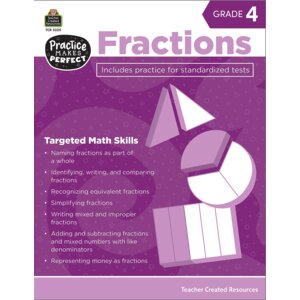

Extend understanding of fraction equivalence and ordering.
Math.4.NF.A.2: Compare two fractions with different numerators and different denominators, e.g., by creating common denominators or numerators, or by comparing to a benchmark fraction such as 1/2. Recognize that comparisons are valid only when the two fractions refer to the same whole. Record the results of comparisons with symbols >, =, or <, and justify the conclusions, e.g., by using a visual fraction model.
| Activity | Page |
|---|---|
| Identifying Fractions | 4 |
| Comparing Fractions | 14-15 |
| Identifying Equivalent Fractions | 16 |
| Writing and Identifying Equivalent Fractions | 17 |
| Recognizing Equivalent Fractions | 18 |
| Mixed Practice with Fractions | 35-39 |
| Cumulative Mixed-Practice Review | 40-45 |
Extend understanding of fraction equivalence and ordering.
Math.4.NF.A.1: Explain why a fraction a/b is equivalent to a fraction (n × a)/(n × b) by using visual fraction models, with attention to how the number and size of the parts differ even though the two fractions themselves are the same size. Use this principle to recognize and generate equivalent fractions.
| Activity | Page |
|---|---|
| Identifying Equivalent Fractions | 16 |
| Writing and Identifying Equivalent Fractions | 17 |
| Recognizing Equivalent Fractions | 18 |
| Simplifying Fractions and Finding Equivalent Fractions | 20 |
| Mixed Practice with Fractions | 35-39 |
| Cumulative Mixed-Practice Review | 40-45 |
Understand decimal notation for fractions, and compare decimal fractions.
Math.4.NF.C.6: Use decimal notation for fractions with denominators 10 or 100. For example, rewrite 0.62 as 62/100; describe a length as 0.62 meters; locate 0.62 on a number line diagram.
| Activity | Pages |
|---|---|
| Representing Money as Fractions | 33-34 |
Understand decimal notation for fractions, and compare decimal fractions.
Math.4.NF.C.7: Compare two decimals to hundredths by reasoning about their size. Recognize that comparisons are valid only when the two decimals refer to the same whole. Record the results of comparisons with the symbols >, =, or <, and justify the conclusions, e.g., by using a visual model.
| Activity | Pages |
|---|---|
| Representing Money as Fractions | 33-34 |
Understand a fraction <i>a</i>/<i>b</i> with <i>a</i> > 1 as a sum of fractions 1/<i>b</i>.
Math.4.NF.B.3b: Decompose a fraction into a sum of fractions with the same denominator in more than one way, recording each decomposition by an equation. Justify decompositions, e.g., by using a visual fraction model. Examples: 3/8 = 1/8 + 1/8 + 1/8 ; 3/8 = 1/8 + 2/8 ; 2 1/8 = 1 + 1 + 1/8 = 8/8 + 8/8 + 1/8.
| Activity | Page |
|---|---|
| Simplifying Fractions and Finding Equivalent Fractions | 20 |
Understand a fraction <i>a</i>/<i>b</i> with <i>a</i> > 1 as a sum of fractions 1/<i>b</i>.
Math.4.NF.B.3d: Solve word problems involving addition and subtraction of fractions referring to the same whole and having like denominators, e.g., by using visual fraction models and equations to represent the problem.
| Activity | Page |
|---|---|
| Simplifying Fractions and Finding Equivalent Fractions | 20 |
| Subtracting Fractions with Like Denominators | 32 |
| Mixed Practice with Fractions | 35-39 |
| Cumulative Mixed-Practice Review | 40-45 |
Understand a fraction <i>a</i>/<i>b</i> with <i>a</i> > 1 as a sum of fractions 1/<i>b</i>.
Math.4.NF.B.3c: Add and subtract mixed numbers with like denominators, e.g., by replacing each mixed number with an equivalent fraction, and/or by using properties of operations and the relationship between addition and subtraction.
| Activity | Pages |
|---|---|
| Adding Fractions with Like Denominators | 21-23 |
| Adding Mixed Fractions with Like Denominators | 24 |
| Cumulative Mixed-Practice Review | 40-45 |
Understand a fraction <i>a</i>/<i>b</i> with <i>a</i> > 1 as a sum of fractions 1/<i>b</i>.
Math.4.NF.B.3a: Understand addition and subtraction of fractions as joining and separating parts referring to the same whole.
| Activity | Page |
|---|---|
| Subtracting Fractions with Like Denominators | 32 |
| Mixed Practice with Fractions | 35-39 |
Apply and extend previous understandings of multiplication to multiply a fraction by a whole number.
Math.4.NF.B.4a: Understand a fraction a/b as a multiple of 1/b. For example, use a visual fraction model to represent 5/4 as the product 5 × (1/4), recording the conclusion by the equation 5/4 = 5 × (1/4).
| Activity | Page |
|---|---|
| Writing and Identifying Equivalent Fractions | 17 |
| Recognizing Equivalent Fractions | 18 |
Common Core State Standards and Expectations© Copyright 2010. National Governors Association Center for Best Practices and Council of Chief State School Officers. All rights reserved.